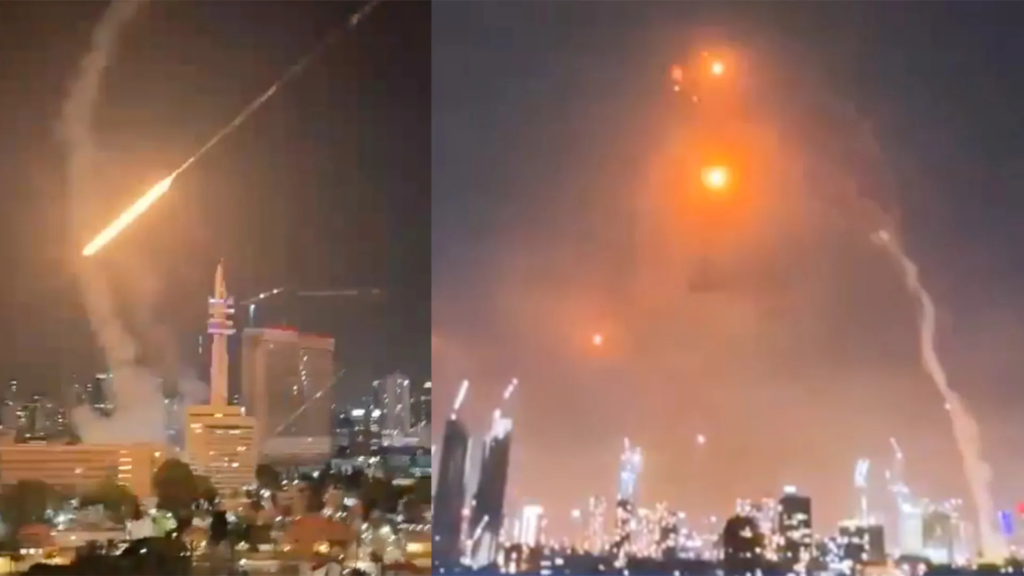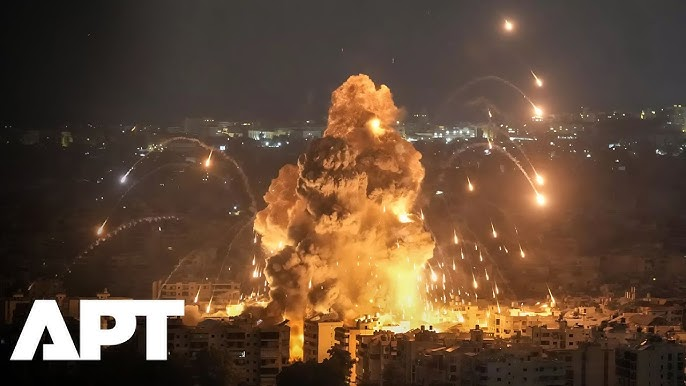In a major escalation in the already tense Middle East situation, Iran launched a large-scale missile counterattack on Israel following deadly airstrikes earlier this week. Tehran confirmed the missile response on Monday morning, saying it was a “legitimate defense” after Israeli jets targeted Iranian military positions in Syria and other border regions.
This exchange marks one of the most dangerous confrontations between the two countries in years, with the potential to drag other regional powers into a broader conflict.
Background: Israeli Airstrikes Triggered Iranian Response

The conflict reached new heights after a series of Israeli airstrikes struck military installations linked to Iran’s Islamic Revolutionary Guard Corps (IRGC) in Syria and near the Iraq border. These airstrikes reportedly killed several IRGC officers and destroyed critical weapons storage sites.
Israel said its actions were in response to intelligence reports of an imminent Iranian threat to its territory. According to Israeli Defense Forces (IDF), Iran was preparing attacks using drones and rockets against Israeli cities.
You can read more about Israel’s airstrike strategy in this detailed report by Al Jazeera.
Iran’s Missile Attack: A “Warning Shot”
Iran’s Supreme National Security Council described the missile counterattack as a “warning shot” and warned of more severe responses if Israeli aggression continues. The missiles reportedly targeted Israeli military bases in the northern Galilee and the Negev Desert, though Israeli defense systems intercepted several projectiles mid-air.
A spokesperson for Iran’s Foreign Ministry said:
“The Zionist regime has crossed a red line. Our missile response is only the beginning.”
Iran’s official news agency IRNA reported that 36 medium-range ballistic missiles were launched, while Iranian state TV showed footage of missiles being fired from underground silos and mobile launchers.
For the Iranian side of the story, see Iran’s IRNA coverage here.
Israel’s Iron Dome Activated, Civilians Take Shelter
Israel’s famed Iron Dome defense system was quickly activated across the northern and southern regions. Sirens wailed in major cities including Haifa, Be’er Sheva, and even near Tel Aviv, prompting thousands of civilians to seek shelter.
The Israeli government has declared a state of emergency in regions close to the Lebanese and Syrian borders. The IDF confirmed it intercepted over 20 incoming missiles, but acknowledged that a few struck near military facilities, causing “light structural damage.”
Prime Minister Benjamin Netanyahu issued a strong statement:
“We will defend our people with strength. Any attack on Israeli soil will be met with full force.”
Follow live updates on The Times of Israel for more real-time developments.
Regional Powers React: Fears of a Larger War
This exchange has alarmed regional and global powers alike. The United States has called for “urgent de-escalation” and condemned Iran’s missile attacks, while also advising Israel to avoid triggering a broader war.

Saudi Arabia, which has recently shown warming ties with Israel under U.S. pressure, condemned both the airstrikes and the counterattack. Turkey, meanwhile, accused Israel of “fueling instability in the region,” while Qatar urged both nations to “return to diplomacy.”
Russia and China expressed concern through diplomatic channels, urging restraint from both sides. UN Secretary-General António Guterres called an emergency meeting of the UN Security Council.
Stay updated with global reactions on Reuters Middle East.
Impact on Global Oil Prices and Markets
The conflict immediately affected global oil markets. Brent crude spiked to over $93 per barrel, and energy experts are warning of price instability if the conflict spreads to oil-exporting nations like Iraq or Saudi Arabia.
Stock markets across Asia and Europe opened lower on Monday, and defense sector shares surged in anticipation of prolonged tensions. Investors are closely watching diplomatic efforts to prevent the conflict from escalating into full-blown war.
For expert financial analysis, check Bloomberg’s Middle East Economy Tracker.
Humanitarian Concerns and Calls for Peace
Amid the military aggression, humanitarian organizations raised concerns about potential civilian casualties and displacement. While no deaths have been officially reported on either side from the missile attacks, medical teams in Israel reported minor injuries and shock-related hospitalizations.
In Gaza and the West Bank, civilians are bracing for fallout, fearing the conflict may spill into Palestinian territories. Aid groups are calling for international mediation to prevent a humanitarian crisis.
Organizations like the International Red Cross and Médecins Sans Frontières are monitoring the situation closely. Read MSF’s latest emergency brief for humanitarian updates.
What’s Next? A Tense Future Ahead
While both Iran and Israel have made clear public statements, analysts warn that this may only be the beginning. Security think tanks believe the missile exchange could trigger a prolonged shadow war, fought through cyberattacks, drone strikes, and proxy groups in Lebanon, Iraq, and Syria.

Analyst Michael Stephens from the Royal United Services Institute (RUSI) said:
“The missile strike was symbolic—but also strategic. Iran wants to shift deterrence, and Israel won’t back down. This is an evolving threat with no easy off-ramp.”
As of now, diplomatic channels are being tested, and the international community is scrambling to mediate. The next few days will be crucial in determining whether this crisis turns into a regional war or calms into a ceasefire.
Final Thoughts
The missile counterattack by Iran on Israeli military positions has pushed the Middle East into a critical moment. With both nations unwilling to back down, the world watches anxiously, hoping that diplomacy can step in before destruction escalates.
Also Read – Pentagon Reveals $134M Price Tag for LA Troop Deployment






